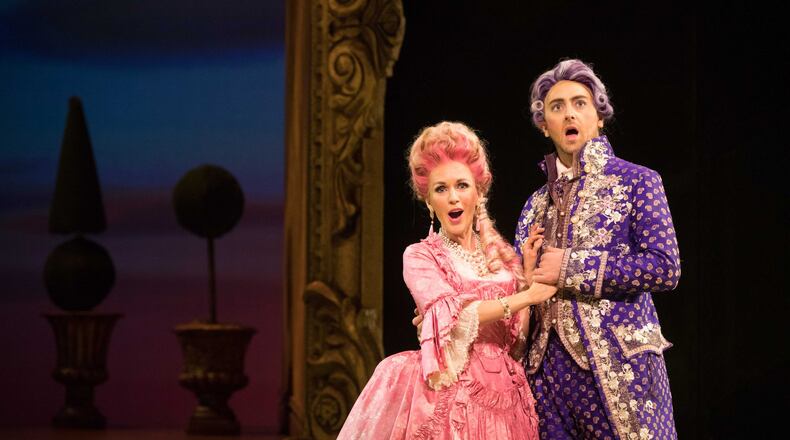OPERA REVIEW
The Atlanta Opera’s “The Abduction From the Seraglio”
7:30 p.m. Oct. 11; 8 p.m. Oct. 14; 3 p.m. Oct. 16. $35-$131. Cobb Energy Performing Arts Centre, 2800 Cobb Galleria Parkway, Atlanta. 404-881-8885, www.atlantaopera.org.
East versus West. Man versus woman. Servant versus master.
Mozart's 1782 singspiel "The Abduction From the Seraglio" revolves around timeless conflicts that would seemingly resonate profoundly in our time. But the current Atlanta Opera production — try as it might — can't surmount the basic superficiality and silliness of the tale. Fortunately, the music itself is unwaveringly divine, even as the comedy and drama falter.
“The Abduction From the Seraglio” has the young Spanish nobleman Belmonte (Ben Bliss) arriving at the palace of Pasha Selim (Tom Key), where his beloved Konstanze (Sarah Coburn) is being held captive in the Pasha’s harem after being kidnapped by pirates. With the help of the comic servant Pedrillo (Matthew Grills), Belmonte disguises himself as an architect to get past the Pasha’s henchman Osmin (Kevin Burdette) and rescue Konstanze and her maid Blonde (Katrina Galka).
Those accustomed to opera by the likes of Verdi and Puccini may take more than a few scenes to adjust to the aesthetic of the singspiel, which includes spoken dialogue, here translated into English, with songs in the original German. There’s ineluctably a kind of jolting stop-and-go pace to the show, as the hall fills with unfailingly heart-melting, gorgeous music followed by unavoidably clumsy-sounding spoken scenes. There are some nice moments, but the drama isn’t always moving and the comedy isn’t always funny.
The director of the English dialogue segments, Chris Alexander, does an admirable job in having his performers inject their short spoken lines with a sense of emblematic significance. This works especially well in early scenes featuring popular Atlanta actor Tom Key in the unusual (for opera) non-singing role of the Pasha. Key brings out the universality of the Pasha’s unsatisfied obsession, eliciting sympathy in a surprisingly touching way for what could easily become a cartoonishly comic villain.
But most of these efforts are ultimately undone by the thinness of the plot and the mishmash of visual cues. The Pasha, who seems richly human and genuinely seductive in early scenes, appears later in ludicrous brass nipple plates and billowing flowered pantaloons.
Similarly, projectionist S. Katy Tucker and scenic designer Jacob Climer’s visuals range from the lush and compelling, as with an enormous full moon hanging over a nighttime scene or heavy exotic curtains deep in the seraglio, to the deliberately chintzy and silly, as in the grainy animated footage of the kidnapping that opens the show.
“Abduction” touches on so many emotions — from the genuine to the ludicrous — that almost any production can feel unsettled, as if cast and crew were still searching for the right tone to strike even after the curtain rises.
If the orchestra sounds too soft and restrained in the opening overture, it’s a restraint one is grateful for when the leads begin to sing. The exquisite voices pop to vivid life with lovely detail and ornamentation evident even in the vast space of the Cobb Energy Centre. The tenor Bliss delivers on his name, giving his arias a luscious clarity and beauty, and Coburn likewise delights, especially in her star-turn delivery of Konstanze’s notoriously difficult aria “Ach ich liebte” with its plaintive opening and its thrilling coloratura runs.
The Atlanta Opera chorus sounds fantastic as always, giving even silly scenes a sense of grandeur and dignity, and the voices of the two leads combine beautifully with the support of Grills and Galka in the famous reunion quartet.
“Abduction” is one of the most popular works in the repertoire, but its peculiar mash-up of elements — music and speech, the elegant and the earthy, the trifling and the universal — hasn’t always found an easy connection with Atlanta audiences. On opening night, some in the audience were clearly delighted, but there were also more than a few empty seats during Act 2 that had been filled during Act 1.
History has it that Emperor Joseph II’s less than favorable review of “Abduction” was that it had “too many notes.” I think Atlanta audiences may differ entirely in their criticism, feeling that, with all of that talking, the notes are simply too few.
About the Author
Keep Reading
The Latest
Featured


